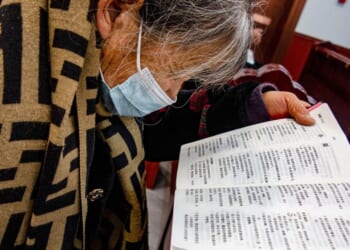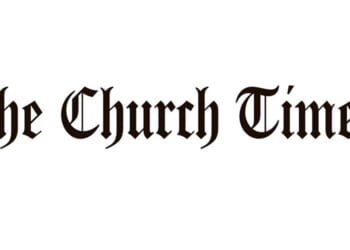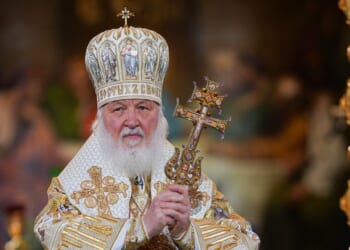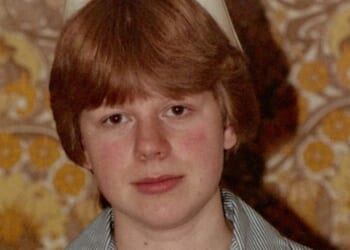This is the text of a talk given to mark the centenary of the establishment of the Feast of Christ the King by Pope Pius XI.
(LifeSiteNews) — This year is the centenary of the establishment of the Feast of Christ by Pope Pius XI. In his encyclical letter Quas Primas, promulgated on December 11, 1925, the Supreme Pontiff ordered that this feast be celebrated annually on the last Sunday of October, beginning in 1926.
In Quas Primas, Pius XI explained that the Church often establishes feasts when a particular error needs to be combatted or the faithful need to be reminded of a particular truth.
For example, he explained that when “reverence and devotion to the Blessed Sacrament had grown cold, the feast of Corpus Christi was instituted” and, so too, “the feast of the Sacred Heart of Jesus was instituted at a time when men were oppressed by the sad and gloomy severity of Jansenism.”
In Quas Primas, the pope expressed his hope for the new Feast of Christ the King:
Nations will be reminded by the annual celebration of this feast … that not only private individuals but also rulers … are bound to give public honor and obedience to Christ. It will call to their minds the thought of the last judgment, wherein Christ, who has been cast out of public life, despised, neglected and ignored, will most severely avenge these insults; for his kingly dignity demands that the State should take account of the commandments of God and of Christian principles (…)
Pius XI, like his predecessors, regarded the religious, moral, economic, and political crises of the modern world, and the human suffering that results from them, as being primarily the result of man’s progressive attempt to liberate himself from the eternal law of God.
Referring back to his first encyclical, he writes:
We referred to the chief causes of the difficulties under which mankind was laboring. And We remember saying that these manifold evils in the world were due to the fact that the majority of men had thrust Jesus Christ and his holy law out of their lives; that these had no place either in private affairs or in politics: and we said further, that as long as individuals and states refused to submit to the rule of our Savior, there would be no really hopeful prospect of a lasting peace among nations … (I)t seemed to Us that peace could not be more effectually restored nor fixed upon a firmer basis than through the restoration of the Empire of Our Lord.
To speak of restoration is, of course, to refer to something which once existed.
“There was once a time” Pope Leo XIII wrote, “when States were governed by the principles of Gospel teaching. Then it was that the power and divine virtue of Christian wisdom had diffused itself throughout the laws, institutions and morals of the people, permeating all ranks and relations of civil society. Then, too, the religion instituted by Jesus Christ, established firmly in befitting dignity, flourished everywhere by the favour of princes and the legitimate protection of magistrates; and the Church and State were happily in concord … The State, constituted in this wise, bore fruits … beyond all expectation whose remembrance is still and will always be in renown[…]”.
And in Rerum Novarum, he taught:
(C)ivil society was renovated in every part by the teachings of Christianity … In the strength of that renewal the human race … was brought back from death to life, and to so excellent a life that nothing more perfect had been known before (…)
And 40 years later, Pope Pius XI taught:
At one time there existed a social order, which, though by no means perfect in every respect, corresponded nevertheless in a certain measure to right reason according to the needs and conditions of the times. That this order has long since perished is not due to the fact that it was incapable of development and adaptation to changing needs and circumstances, but rather to the wrongdoing of men.
These popes were referring to the many centuries when western society was integrally Catholic, and when those who held power in the state sought, for the most part, to fulfil their obligations to God and His Church.
The unity of Christendom was broken at the Reformation, but it was during the course of the 18th and 19th centuries that the bonds which held Catholic societies together were progressively dissolved.
And the ideology primarily responsible for this dissolution has been identified, and condemned, by the Roman Pontiffs under the name of Liberalism.
When I use the term Liberalism in this talk, I use it in sense in which the popes used it.
In brief, Liberalism is the assertion of man’s independence from any necessary submission to an order existing outside his own intellect and will.
It asserts the supremacy of the human intellect and the human will and rejects the necessity of subordination to the Divine Intellect and the Divine Will.
Liberalism holds that it is the individual man who must determine for himself what is true and what is good and this exercise of freedom is regarded by the Liberal as man’s highest good.
This directly contradicts the teaching of the Catholic Church which is that God is the source of all being, all truth, all goodness, and that man’s highest good is found in contemplating Him for all eternity in the beatific of vision of Heaven.
Liberalism, Leo XIII teaches, proclaims, “the supremacy of the human reason, which, refusing due submission to the divine and eternal reason, proclaims its own independence, and constitutes itself the supreme principle and source and judge of truth.”
And he goes on:
(T)hese followers of liberalism deny the existence of any divine authority to which obedience is due, and proclaim that every man is the law to himself; from which arises that ethical system which they style independent morality, and which, under the guise of liberty, exonerates man from any obedience to the commands of God, and substitutes a boundless license.
Of course, not everyone influenced by Liberalism, or who holds doctrines that derive from Liberalism, would necessarily go so far as to reject the moral law in its entirety.
But that is due to the inconsistency of human beings. We often fail to follow our beliefs through to their logical end. But all forms of Liberalism – religious, moral, economic and political – have their ultimate origin in man’s declaration of independence from the divine and eternal reason of God.
Liberalism, it should be clear, is utterly incompatible with the Catholic faith, which proclaims the absolute sovereignty of God.
Between the Catholic Church and Liberalism there has been constant and unremitting conflict.
With roots in the 16th and 17th centuries, Liberalism gained strength in the 18th century – the so-called Enlightenment – and began to shape the policy of governments in a way harmful both to the Church and to the well-being of the peoples they were supposed to serve.
The French Revolution of 1789 opened what can be called “the long 19th century” and a series of wars and revolutions that destroyed the Christian order of Europe.
And while modern Liberals like to give the impression that Liberal principles spread steadily and peacefully due to their self-evident nature, the truth is quite different. In fact, in Catholic nations, Liberalism was generally imposed violently by revolutions, civil wars, conspiracies, secret societies, assassinations, terrorism, rigged elections, widespread seizures of property, and mass slaughter amounting to genocide in some regions.
The 19th century, far from being an era of peaceful progress, was in much of the Catholic world an era of violence exceeded only by the horrendous wars and revolutions of the 20th century. For example, civil wars, were fought in many nations, including Spain, Portugal, Italy, Mexico, Argentina, Uruguay, the Central American Republic, and many more.
In each case, these were wars with Liberals on one side, and opponents of Liberalism on the other.
And where the Catholic Church was strongest the violence used to impose Liberalism was greatest.
For example, in Spain, where the counter-reformation had taken root perhaps more strongly than anywhere else, there were continual wars and revolutions from the first decade of the 19th century, until the Spanish Civil War concluded in 1939.
In Mexico, the first half of the 19th century was marked by political conflict between Liberals and conservatives, and between rival branches of Freemasonry. There were two full-scale civil wars between 1857 and 1861, and between 1862 and 1867, and from 1876 to 1911 a Liberal dictatorship under which the living standards of much of the population declined, to a great extent as a result of the liberal regime’s confiscation and distribution of Indian communal land. Then, from 1911, Mexico suffered almost three decades of successive revolutions and civil wars. The famous Cristeros uprising, during which Catholic rebels rose in the name of Christ the King, was only one episode in a much more extensive conflict.
To give another example, Italy was united under a Liberal regime during the 1850s and 1860s in a movement called the “Risorgimento” – the “Resurgence.” According to liberal propaganda, this was a spontaneous national movement for liberty and unity.
In fact, it was a series of military conquests of independent Italian states, followed by rigged plebiscites in which 99% of the population would reliably vote to join a united Italy, and resistance would be violently suppressed. For example, in the Kingdom of the Two Sicilies, one of the states forcibly incorporated into the new Italy, up to 60,000 people may have been killed. The end of the “risorgimento” came in 1870 with the military invasion of the papal states, the defeat of the papal army, and the occupation of Rome.
And I think it is no exaggeration to say that the whole of the west today is occupied territory, governed by Liberal regimes that have been established on the ruins of Christendom.
The Catholic order
Having given this brief historical overview, I would now like to step back and look a little more closely at the contrasting, and utterly irreconcilable, systems of Catholicism and Liberalism.
First, I would like to set out, as briefly and simply as possible, the order of reality against which Liberalism rebels.
Then, equally briefly, to how Liberalism opposes this order in the areas of religion and politics. Due to time constraints, I will only touch lightly on economic and moral Liberalism in this presentation.
The Catholic begins from the simple truth that God is the creator of all things, that He sustains all things in being at every moment of their existence, and that He is the final end to which all things are directed.
Everything which exists, from the smallest grain of sand to the mightiest angel, is directed towards its proper end by Divine Providence.
This direction of all things, by God’s eternal reason, we call the eternal law.
And, as St. Thomas Aquinas teaches, there is nothing, absolutely nothing, that is not directed to its end by the eternal law.
The natural law
This means that we human beings are also directed by God to our final end by the eternal law.
But we humans differ from all other material creatures because we are rational beings with the faculties of intellect and will. With free will, we have power over our actions, and the freedom to direct ourselves.
God, therefore, must direct rational creatures in a way which differs from the way he directs other creatures, which are each directed according to the specific natures he has given them.
Like all creatures, we have the eternal law of God “imprinted” onto us.
As St. Paul teaches:
For when the Gentiles, who have not the law, do by nature those things that are of the law; these having not the law are a law to themselves: Who shew the work of the law written in their hearts, their conscience bearing witness to them, and their thoughts between themselves accusing, or also defending one another. (Rm 2:14-15)
This is what we call the natural law. The first principles of moral reasoning imprinted on us, by which our conscience judges what we are to do, and what we are to avoid.
By means of the natural law, we have, says St. Thomas, a share in the very eternal reason of God, by which we are directed toward our proper end.
And as God governs and directs all things, He must also direct us as social beings, and He does so by means of human authorities, whose nature and authority derive from Him.
Many forms of society exist, but only two are permanent and necessary in the natural order, and these are the family and the state.
The first of all societies, the great theologian Cardinal Louis Billot wrote, “is the society which has been instituted by God Himself, the Author of nature, a society, which is beneficent among all others, anterior to all political society, attuned to the more intimate affections of the human heart, and demanded by the more evident needs of both our moral and our physical life: I mean domestic society, commonly known as the family.”
And of the state, Pope Leo XIII teaches:
Nature herself proclaims the necessity of the State providing means and opportunities whereby the community may be enabled to live properly, that is to say, according to the laws of God.
And St. Paul teaches in his letter to the Romans:
Let every soul be subject to higher powers: for there is no power but from God: and those that are, are ordained of God. Therefore, he that resisteth the power, resisteth the ordinance of God. (Rm 13: 1-3)
And he continues:
For he is God’s minister: an avenger to execute wrath upon him that doth evil. Wherefore be subject of necessity, not only for wrath, but also for conscience’ sake. (Rm 13: 4-5)
Much could be said about these two societies, but what I wish to draw attention to here is that both the family and the state derive their nature and their authority from God, who has established the natural order of which they are necessary part.
They do not derive either their nature or their authority from the will of man.
As both paternal and political authority come from God, they call forth our obedience. But precisely because all authority comes from God, those who exercise it are, as St. Paul says, God’s ministers. They exercise power on His behalf, and they are strictly bound to use it only for the purposes for which it was given, that is, the good of those over whom they have authority.
The family and the state are natural societies, primarily instituted to direct us toward our natural end.
But, of course, we also have a supernatural end, which is supernatural happiness in the eternal vision of God.
The society that directs us toward that end is the Catholic Church, whose hierarchy exercises the threefold authority of teaching, governing, and sanctifying, which is derived immediately from Jesus Christ.
This supernatural society is the highest society on earth due to its divine nature – it is the Mystical Body of which Jesus Christ is the Head – and its more exalted end.
The Church and the State are in one sense separate because they have different ends. The State working for the temporal good of a particular community and the Church working for the supernatural good of all mankind.
However, as stated earlier, nothing falls outside the divine government, and so no aspect of human life, including the direction of the state, can fall beyond the sovereignty of Jesus Christ.
And here we reach the major point of conflict between Liberalism and the Catholic Church.
Liberalism, asserting as it does, man’s independence from the supernatural order, states that the state should be entirely independent of the Church.
The Church, on the other hand, asserting as it does the absolute sovereignty of God, insists that the temporal sword of the state must be placed at the service of the spiritual sword of the Church.
Every individual has an obligation to believe in God, to receive the gospel of Jesus Christ, and to live according to it. This obligation does not cease when individuals come together to form societies.
As Pope Leo XIII teaches:
Nature and reason, which command every individual devoutly to worship God in holiness, because we belong to Him and must return to Him, since from Him we came, also bind the civil community by a like law.
This is because:
(M)en living together in society are under the power of God no less than individuals are, and society, no less than individuals, owes gratitude to God who gave it being and maintains it and whose ever-bounteous goodness enriches it with countless blessings. Therefore, just as individuals have duties towards God, the State which is composed by those very individuals, must “act up to the manifold and weighty duties linking it to God, by the public profession of religion.”
And the state is not free choose a religion for itself but is bound to adhere to the religion that is true.
Leo XIII teaches:
(N)o one is allowed to be remiss in the service due to God, and since the chief duty of all men is to cling to religion in both its teaching and practice – not such religion as they may have a preference for, but the religion which God enjoins, and which certain and most clear marks show to be the only one true religion – it is a public crime to act as though there were no God.
So, too, is it a sin for the State not to have care for religion as a something beyond its scope, or as of no practical benefit; or out of many forms of religion to adopt that one which chimes in with the fancy; for we are bound absolutely to worship God in that way which He has shown to be His will.
Therefore, the separation of Church and state, in the Liberal sense of the term, is a sin.
To summarize this section:
God is the source of all truth and all authority. He directs human beings toward their proper end, by means of the natural law written on their hearts, and by means of authorities that derive their power from Him, namely domestic, political, and ecclesiastical authority.
It is against these forms of divinely ordained authority that Liberalism rebels.
Liberalism – the anti-Catholic order
The primary target for Liberal regimes is always the Catholic Church.
Indeed, the historical origin of Liberalism is to be found in the Reformation.
The Protestant Reformers repudiated the necessary role of ecclesiastical authority in teaching authoritatively the content of divine revelation.
The Reformation substituted instead the principle of “sola scriptura,” which led to the ever-increasing fragmentation of Protestant belief, and to the widespread acceptance of the principle of private judgment, that is, each individual must decide for himself the meaning of Sacred Scripture.
And private judgment ultimately came to be regarded not just as a practical necessity but as a right to be defended against all attempts by ecclesiastical or political authorities to impose a particular understanding of revelation.
The formulation of the idea that the individual who has the right to decide what God has revealed was the beginning of religious Liberalism.
And, as the 18th century advanced, this developed from the assertion of the individual right to interpret Christian revelation to the right to complete independence in religious matters, that is, the right to reject Christianity, and even belief in God.
Today, of course, it is regarded as the right of every person to believe, or not believe, whatever they choose.
Religious liberalism is closely related to the development of political liberalism.
Religious liberalism asserts man’s independence from submission to ecclesiastical authority and political liberalism asserts man’s independence from submission to political authority, understood as deriving its power from God.
Liberalism asserts that the authority of the state derives from man.
In the Liberal system, the state is not part of a natural order willed by God but arises from a “social contract” whereby individuals each surrender a measure of freedom in order gain a measure of security.
Individuals agree to live together in society and not to murder each other, steal from each other, and so on.
But the authority of the state to enforce such laws derives from the individual human wills that are thus pooled together, hence the modern, now almost dominant, view that democracy with a wide franchise is the only legitimate form of government.
The Catholic Church, on the other hand, regards all forms of government as legitimate if they can attain the end for which the state exists, namely the common good of the people over which it rules.
According to Liberal doctrine, as the authority of the state is derived from the individuals who compose it, rather than from God, the state represents the collective will of the people.
For the Liberal, it is this collective will of the people that ought to determine the state’s laws and actions, not the eternal law of God.
Just as the individual will is free from any obligation to conform to an order beyond itself, so the state is similarly free.
Thus, the state is not bound by any obligations toward God and His Church, or to the observance of the moral law itself.
Also inherent in this Liberal political conception is that the will of the majority must prevail, because there is no external order to which the actions of the state must be held to conform.
Of such political theories, Leo XIII teaches:
The end of all this it is not difficult to foresee, especially when society is in question. For, when once man is firmly persuaded that he is subject to no one, it follows that the efficient cause of the unity of civil society is not to be sought in any principle external to man, or superior to him, but simply in the free will of individuals; that the authority in the State comes from the people only; and that, just as every man’s individual reason is his only rule of life, so the collective reason of the community should be the supreme guide in the management of all public affairs. Hence the doctrine of the supremacy of the greater number, and that all right and all duty reside in the majority.
“Now, this,” he teaches “is simply a road leading straight to tyranny.”
The history of the 19th century bears this out.
Rebellion against the Church
The Liberal state, claiming as it does to represent the general will of the people, above which there is no higher authority, can brook no rivals.
There are two societies that the Liberal state finds particularly threatening, because they are established by God, and exercise power derived from Him.
These two societies are the Catholic Church and the family.
I have already noted that the Catholic Church is always the first target of Liberal revolutions. Every revolution since the French Revolution has turned with fury against the Church.
Here is a brief extract describing what happened to the Church in Mexico after the War of the Reform, one of the civil wars I mentioned earlier that could stand in for many other Liberal persecutions of the Church:
“The war was over, but the conflict went on … One historian coined the perfect phrase for this period: ‘The Pickaxe of the Reform.’ Eminent Liberals literally picked up axes to destroy altars, church facades, pulpits, and confessionals. Scenes out of the French Revolution were reenacted. Images of saints were decapitated, shot full of holes, burned in public autos-de-fé: Church treasuries were robbed, archives were plundered, ecclesiastical liberties went up in flames. Bishops were stoned to death, and Church property was auctioned off. Nuns who had spent their whole lives cloistered were suddenly forced out of their convents.”
That extract could be repeated, in almost the same words, to describe what happened across the Catholic world in the 19th century.
The family is also not permitted to enjoy an existence independent of the liberal state.
Cardinal Billot writes:
(The family) too … will experience the adverse blows of Liberalism, which latter, as far as in it lies, by every means and device, by every effort, by every resource at its disposal, purposes ‘ the destruction and elimination of the family, so that one might well say that, for the legislators of the Revolution, this in truth was the Carthage to be destroyed. And Liberalism destroys it first in its foundation. For the foundation of the family is marriage, and that indissoluble marriage, through an indivisible obligation binding in common both the man and the woman unto the very end. – Moreover, how contrary such an obligation is to the liberty and emancipation of the individual, is easy for all to see at a glance.
And Billot goes on to say that one of the first things that Liberals do upon gaining power is to legalize divorce, precisely to undermine the family at its foundation.
Billot also stresses two other methods that Liberals use, first taking control of education and denying the rights of parents as the primary educators of their children, and second, using inheritance taxes to destroy the family as an institution that persists through time.
They want families instead to be temporary societies that have to be formed anew in every generation.
And, of course, in the time since Billot’s death, attacks om the family have increased with ever-new and destructive means that include abortion, contraception, threats to parental authority, transgenderism, and many more.
In short, Liberalism recognizes only the sovereign individual and the sovereign nation.
This leads it to weaken or destroy not only the family but all other societies that stand between the individual and the state, often leaving the individual isolated and defenseless.
For example, Liberalism acts to destroy or weaken all collective, communal, ownership of land and property in favor of individual ownership. This is one of the reasons, in addition to the religious motive, for the Liberal assault on ecclesiastical authority and especially on the religious orders.
Further exploration of this topic, and of economic Liberalism, is unfortunately not possible given time constraints.
Some conclusions
God has given us free will. We have the power to choose good or to choose evil.
We have the power to sin. And sin has been a part of the human condition since the fall.
But Liberalism is something more than individual sinful actions. Liberalism is the repudiation of the entire intellectual and moral order, because liberalism proclaims man’s independence from any obligation to conform the intellect truth, and the will to the good.
Hence the Spanish priest Don Felix Sardá y Salveny, wrote:
“In the order of doctrines, Liberalism is the universal and radical heresy, because it contains them all; and in the order of actions, it is the universal and radical transgression, because it authorises and sanctions them all.”
In our day, Liberalism has entered into what may well be its final phase, the attempt to liberate not only from ecclesiastical and political authority but from the most evident moral norms and realities of the natural order.
This is perhaps most evident in phenomenon of transgenderism in which the human will asserts its independence of the physical nature of the body itself.
Here we see clear consequences of the assertion that the human will is free from any necessary conformity to any order of reality.
How many people really believe that a man may decide by an act of the will to be a woman or a woman to be a man? But if they don’t believe it, why has so much of the political establishment gone along with it?
I think the answer to that question is that the only way they could reject transgender ideology would be to formulate an argument based on the obligation of the human intellect, and the human will, to conform itself to objective reality. However, that cuts at the very root of Liberalism.
Any man or woman who wishes to think themselves free from any obligation to conform to an order that imposes itself on their intellect or will must be careful not to acknowledge such an obligation in any area of life. Consciously or unconsciously, these Liberals know that this is a path that leads not only to recognizing the obligation to observe every precept of the moral law but would ultimately lead to submission to the Sacred Magisterium of the Catholic Church.
The great unanswered question for our society is if, and when, the obligation to conform the intellect and will to the order of reality will once again be generally recognized.
These words of Cardinal Billot, written more than a century ago, still reflect the situation that faces us today, though the social disintegration caused by Liberalism is much further advanced. He writes:
(T)here are many who still remain on the surface of the problem, not perceiving as yet the essential character of the Revolution, which is satanic. But there are others, too, who go deeper into the matter, and thoroughly understand that the religious question underlies all others that are now being agitated; that the plague of political and economic liberalism was born of the atheistic anti-Christian liberalism of which we Have spoken…; that, in fine, the social order can in no wise be upheld and stabilized, until the Church resumes the direction of social affairs. It is to be hoped, therefore, that, with the assistance of divine grace, these seeds may mature to ripeness, that these principles having been theoretically acknowledged may become the foundation of a restoration. And such a restoration we welcome from the bottom of our hearts, knowing that under that pagan legislation, beneath which we now live, individual Christians, indeed, can still exist, but that there cannot be any truly Christian society.
If we want to see a Christian society, then there is no solution other than that proposed by Pius XI 100 years in the encyclical letter Quas Primas:
“(T)hat not only private individuals but also rulers … are bound to give public honor and obedience to Christ.”

















